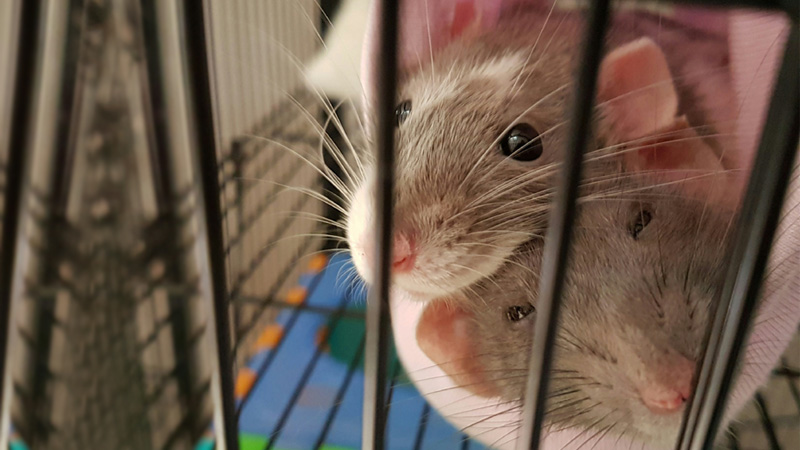Which Are Better Pets: Male or Female Rats?

Photo by Annemarie Horne on Unsplash
When it comes to choosing a pet rat, one of the first decisions you will face is whether to get a male or a female. Both male and female rats make wonderful pets, but they do have some differences in behavior and care needs. In this article, we will explore the pros and cons of owning male and female rats to help you make an informed decision based on your preferences and lifestyle.
Behavioral Differences
One of the most notable differences between male and female rats is their behavior. Male rats, also known as bucks, are generally more laid-back and relaxed compared to their female counterparts. They tend to be more docile and enjoy lounging or sitting on their owner's lap. Male rats are often described as easy-going and less likely to engage in hyperactivity or mischief.
On the other hand, female rats, commonly known as does, are generally more energetic and curious. They are often more active and constantly exploring their surroundings. Female rats tend to be more playful and enjoy interactive toys or tunnels. They are known for their desire to investigate and climb, making their cages more stimulating.
Scent Marking and Aggression
Another factor to consider when choosing between male and female rats is scent marking and aggression. Male rats have the tendency to mark their territory more often than females. They will regularly leave small droplets of urine to scent mark their space. This behavior can result in a slightly stronger odor in their living area compared to female rats. However, with proper cage cleaning and maintenance, the odor can be managed effectively.
In terms of aggression, male rats may show more territorial aggression towards other male rats. If you plan on keeping multiple rats, it's important to note that males have a higher likelihood of fighting or displaying dominance behaviors. They may establish a hierarchy within the group, which can sometimes lead to scuffles or squeaky disagreements. However, with proper introductions and socialization, male rats can coexist harmoniously.
Female rats, on the other hand, are known for their strong social bonds and ability to live peacefully together. They have a natural inclination to form close-knit groups and tend to establish a stronger sense of camaraderie. Female rats are generally more accepting of new cage mates and are less likely to engage in aggressive behavior with one another.
Hormonal Changes and Heat Cycles
One important consideration when deciding between male and female rats is the impact of hormonal changes. Female rats go through regular heat cycles throughout their lifespan. During these cycles, they may display different behaviors and physical characteristics. Some owners find these changes to be a bit more challenging to manage, as female rats can become more hormonal and moody during these times.
It's also worth noting that unspayed female rats are at a higher risk of developing health issues such as mammary tumors or uterine infections. Neutering or spaying female rats can help reduce the risk of these health problems. However, spaying can be a more invasive procedure for female rats compared to neutering for males.
Male rats, on the other hand, do not go through heat cycles. They do not experience the same hormonal fluctuations as females, which can make managing their behavior and health needs more straightforward. Neutering male rats is a less invasive procedure that can help reduce aggression and certain health concerns, such as testicular tumors.
Bonding and Interaction
The ability to bond with and interact with your pet rat is a crucial aspect of pet ownership. Both male and female rats are capable of forming strong bonds with their owners. However, the way in which they interact and bond may differ.
Male rats are often described as more cuddly and affectionate. They tend to enjoy being held and petted, making them excellent lap pets. Male rats are generally more laid-back and calmer, which can make them the ideal choice for individuals who prefer a more relaxed and snuggly companion.
Female rats are typically more active and adventurous, making their interactions with their owners more dynamic. They enjoy exploring their environment and engaging in playtime activities. Female rats are often seen climbing on their owners, grooming their hair, or engaging in interactive games. If you are looking for a pet rat that will keep you entertained with their energy and curiosity, a female rat may be the perfect companion for you.
Space Requirements
Considering the space requirements for pet rats is another essential aspect to consider. Both male and female rats need a spacious cage with plenty of room to move, explore, and play. However, male rats tend to be slightly larger in size compared to females. This means that they may require a slightly larger cage and more room to roam comfortably.
It's important to provide a suitable environment for your pet rat, with ample space for climbing, hiding, and playing. A multi-level cage with platforms, tunnels, and toys can help keep both male and female rats mentally and physically stimulated. Ensuring that your rat has enough space to exercise and explore is vital for their overall well-being.
Making Your Decision
In the end, the decision between male and female rats as pets ultimately comes down to personal preference and the specific characteristics you are looking for in a furry companion. Both males and females have their unique qualities and can make wonderful pets.
If you prefer a more laid-back and cuddly rat that enjoys lap time and relaxation, a male rat may be the best fit for you. On the other hand, if you enjoy an active and adventurous pet that will keep you entertained with their energy and curiosity, a female rat may be more suitable.
Regardless of whether you choose a male or female rat, providing them with a loving home, proper care, and social interaction will help foster a strong bond and ensure a fulfilling relationship for both you and your new pet.
You May Also Like
 Pet RatsExploring The 4 Largest Pet Rat Breeds
Pet RatsExploring The 4 Largest Pet Rat Breeds Pet RatsWhat is the Best Number of Rats to Have as a Pet?
Pet RatsWhat is the Best Number of Rats to Have as a Pet? Pet RatsExploring the 7 Different Types of Pet Rats
Pet RatsExploring the 7 Different Types of Pet Rats Pet RatsAre Rats a Good Pet? Exploring the Benefits of Pet Rats
Pet RatsAre Rats a Good Pet? Exploring the Benefits of Pet Rats Pet RatsWild Rats vs. Pet Rats: What Is the Difference?
Pet RatsWild Rats vs. Pet Rats: What Is the Difference? Help & AdviceExploring 10 Easiest Exotic Pets to Take Care Of
Help & AdviceExploring 10 Easiest Exotic Pets to Take Care Of